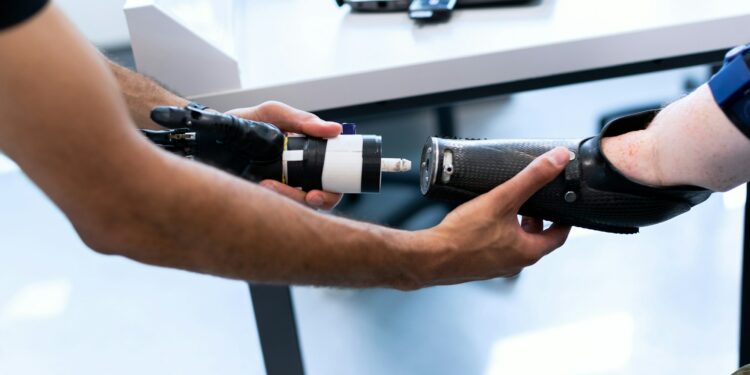This isn’t sci-fi anymore.
Fabrizio, a 57-year-old man from Pistoia, Italy, found himself pleasantly surprised by the capabilities of his newly fitted prosthetic hand, thanks to a remarkable encounter with one of the researchers involved in its development.
Describing the experience, Fabrizio recalled, “When one of the researchers placed the sensor on his own body, I could feel the warmth of another person with my phantom hand. It was an incredibly emotional moment for me, almost like rediscovering a connection with someone.”
This newfound sensation was made possible by cutting-edge sensors integrated into the prosthetic hand, offering realistic and immediate thermal feedback to the wearer. Recently documented in a report published in the journal Med, these sensors represent a significant advancement in artificial limb technology.
For the first time, individuals like Fabrizio can experience natural temperature sensations through their prosthetic limbs, marking a significant milestone in sensory restoration for amputees, according to co-senior study author Silvestro Micera, a professor of biorobotics research at the Sant’Anna School of Advanced Studies in Pisa, Italy.
Known as the “MiniTouch” device, this innovation utilizes readily available electronics and does not require surgical intervention to restore temperature sensation. Micera emphasized the simplicity of the concept, suggesting its potential for seamless integration into commercial prostheses.
In Fabrizio’s case, the device was connected to a point on his remaining forearm, enabling him to experience thermal sensations akin to those felt by a phantom index finger. With the MiniTouch, Fabrizio demonstrated remarkable accuracy in discerning between objects of varying temperatures, significantly surpassing his abilities without the device.
Moreover, the MiniTouch enhanced Fabrizio’s ability to distinguish between human and prosthetic arms while blindfolded, highlighting the device’s potential to enhance amputees’ sense of embodiment and overall functionality.
Co-senior researcher Solaiman Shokur, chair of translational neuroengineering at École Polytechnique Fédérale de Lausanne in Switzerland, stressed the importance of sensory feedback in optimizing the performance of prosthetic hands. He envisioned the development of a comprehensive system integrating touch, proprioception, and temperature sensations.
With ongoing advancements in sensory restoration technology, individuals like Fabrizio are poised to benefit from prosthetic limbs that not only replicate human movement but also provide a lifelike sensory experience, narrowing the gap between artificial and natural capabilities.

































Discussion about this post